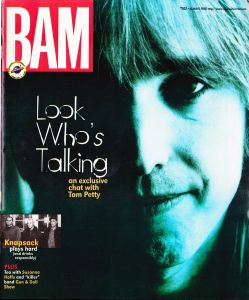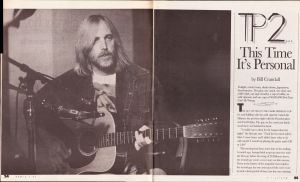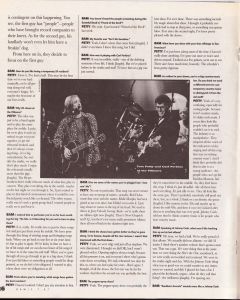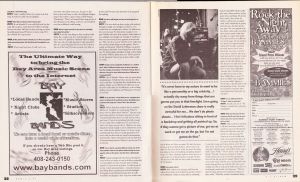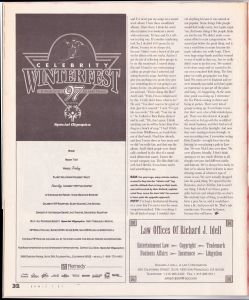Editor's Note: Thanks to Sue Reaney for the scan!
TP2...This Time It's Personal
By Bill Crandall
BAM - February 7, 1997
Twilight, a hotel room, shades drawn, Japantown, San Francisco. Two guys, one couch, one chair, one coffee table, one tape recorder, a cup of coffee, an unlit cigarette, and one copy of 50,000,000 Elvis Fans Can't Be Wrong.
The guy sitting in the chair drinking coffee and fiddling with the unlit cigarette rocked the Fillmore the previous night with the Heartbreakers and Carl Perkins. The guy on the couch just kinda stood there and bobbed his head.
"I couldn't go to sleep for the longest time last night," the first guy says. "I had far too much adrenaline. I came home and I didn't know what to do with myself. I wound up playing the guitar until 4:30 or 5:00."
This meeting had been some time in the making. A month ago, having failed to get an interview with the first guy before his string of 20 Fillmore shows, the second guy wrote a cover story on him anyway. Never in the history of the magazine that employs the second guy has one artist graced the cover in such a short period of time, but this very meeting is contingent on this happening. You see, this first guy has "people"—people who have brought record companies to their knees. As for the second guy, his landlady won't even let him have a freakin' dog.
From here on in, they decide to focus on the first guy:
BAM: How do you like being a temporary SF resident?
PETTY: I love it. I've had a ball. This may be the best time we've ever had: musically, we're all getting along real well, everyone's happy. It's maybe the best time of our lives really.
BAM: Why 20 shows at the Fillmore?
PETTY: The idea was just to be a band again and to play the same place for awhile. Lately, for us to play is such an ordeal: to get everyone together, to get the rehearsal booked, and then it's always a touring thing—it's a big commitment. So, outside the studio, we really don't play much. I enjoy the rehearsals usually more than the gigs [laughs]. The Heartbreakers don't really rehearse much of what they play in concert. They play everything else in the world—maybe on the last night we run through it. So I just wanted to play in that kind of environment where it would be conducted pretty much like a rehearsal. The other reason really was it's such a good group that I wanted people to really see it and hear it.
BAM: I noticed that in particular you've so far been avoiding the big '70s hits. Is it liberating for you to not have to play them?
PETTY: It is, really. It's really nice to just let those songs rest and just put them away for awhile. we have gone through this thing of retiring songs and bringing songs back. When you go back to one five or six years later, it's fun to play it again. We're lucky in that we have a lot of hit songs and we can do two hours of hit songs if we have to in the concerts and stuff. When you've gone through all you go through to go to a big show, I think if we just did blues or something people would be disappointed, so we do feel a bit obligated. I wanted to play where there were no obligations at all.
BAM: From where you're standing, what songs have gotten the best reaction?
PETTY: I haven't noticed. I don't pay any attention to that.
BAM: You haven't heard the people screaming during [the Grateful Dead's] "Friend of the Devil"?
PETTY: Oh yeah. I just learned "Friend of the Devil" last week.
BAM: My favorite was "Ain't No Sunshine."
PETTY: Yeah, I don't know where that came from [laughs]. I didn't even know I knew that song, but I did.
BAM: How was it playing with Carl Perkins?
PETTY: It was incredible, really—one of the defining moments of my life, I think [laughs]. But we've played before in the studio and stuff. To have him at a gig was just surreal.
BAM: Give me some of the names you've plugged into "Jammin' Me"?
PETTY: No one in particular. The song was never meant to have any set group of names—actually, Bob Dylan wrote that verse with the names. Eddie Murphy has been pissed at me ever since, but I didn't even write it. I just sing whatever comes to the top of my head. We used to throw in Jerry Falwell, George Bush—we're really short of villains right now [laughs]. There's Newt Gingrich and O.J., but there's not many really prominent villains; they're all sort of back in the shadows right now.
BAM: I think the shows have gotten better as they've gone along. To be honest, despite all the rave reviews, I wasn't that impressed with the first show...
PETTY: Yeah, we were edgy and just off an airplane. We were disoriented. I thought we did OK, but I wasn't pleased with it. Opening night is always rough, because all this pressure is on, and everyone's there who's gonna write down everything. We only rehearsed two days for this, so when you don't play for years...But I agree. I thought, of all the shows, the first one was by far the weakest. And then the second one was probably the best.
BAM: The pepper-spray show?
PETTY: Yeah. The pepper-spray show was probably the best show I've ever done. There was something incredibly magic about that show. I thought it probably had to cosmicly stop at that point, or something was gonna blow. Ever since the second night, I've been pretty pleased with the shows.
BAM: What have you done with your time offstage in San Francisco?
PETTY: I've just been asleep most of the time; I haven't really done anything. I've gone out once or twice and driven around. I looked at a few guitars, went out to eat. There ain't been much time, honestly. The schedule's been pretty rigorous.
BAM: As evident in your shows, you're a big country-music fan. Do you think we need a different term for contemporary country music to distinguish it from the old stuff?
PETTY: Yeah, it's very confusing, especially for young people, because it isn't country music; it's shitty rock music. I swear they look like people who couldn't cut it in rock. The industry is so manipulative. They adopted all the worst of the rock-arena tricks: staging and all this crap that was everything country wasn't. And I think they probably did that to aim it at a young audience—the people who can't go for Marilyn Manson, but they're somewhere in the middle. So, they feed them this crap. I think it's just dreadful—like all them hats and everything. It's just silly to me. They all look like the same guy. There's probably somebody still good out there, but, as a whole, I think we can dismiss the genre [laughs]. I like country in the '50s and maybe up to about the mid-'60s, and then it was very isolated after that as to anything that was very good. Johnny Cash told me that he thinks country music is for people who hate country music.
BAM: Speaking of Johnny Cash, what was it like backing him up on his last album?
PETTY: Oh man, we had a ball. We're really proud of that album. We actually did two albums—we did 33 tracks. I think there's another volume that's gonna come out. That was a gas. We were doing that at the same time we were doing the She's the One soundtrack, so we were really overworked and scattered. We were in the studio night and day. With the Johnny Cash thing what was so good was we could wander to any instrument we wanted, and did. I played the bass a lot. I played the keyboards, organ—what do they call that thing?—the mellotron [laughs]. I'm spacing out.
BAM: "Southern Accents" sounds more like a Johnny Cash song than a Tom Petty song.
PETTY: Yeah, I couldn't believe he wanted to do that song. It made me really nervous [laughs].
BAM: What did you think of how it turned out?
PETTY: It was beautiful. it was really full-circle for that song. He's so great. I wish they'd recorded everything between the tkes. He'll just sit there and sing you some beautiful gospel song. He knows so many songs. He's the real-deal; he's a great man.
BAM: Of the stuff we haven't heard yet, are there any particularly interesting tracks, like the Beck and Soundgarden covers?
PETTY: There must have been. I can't even remember what all the songs were, because we did them so fast, but I know we did a lot of Jimmie Rodgers songs. I know there's a great version of Neil Young's "Pocahontas." There's a Leonard Cohen song too that I don't think got on the album, so there's a lot of stuff left over that is definitely worth hearing.
BAM: Was it a good exercise for you to be in somebody else's band for awhile?
PETTY: It was the same thing as when we played with Dylan for a couple years. It's a real education to see how it feels to be guided by somebody who's in charge. That can either be really pleasing or really uncomfortable. It's a good education for me as to how I relate to the rest of the band. We learn so much every time we do this stuff. We learn a lot about how to be prepared for anything.
BAM: Are there still people you have a burning desire to play with?
PETTY: I've never had any desire to play with anybody. Strangely enough, any well-known artist I've ever worked with was completely by chance. It's kind of cosmic to me, because I've been lucky enough to even grow friendly with most of the people I really admire. It was nothing I ever thought out. Actually, I would have been way too nervous to ever approach someone and say, "Hey, let's do a record." And I've never really been keen on that: people doing records together. They're usually not that good. I think the Wilburys was good; I liked being in that band. I saw George four or five days ago. We had breakfast and talked. I think we'll probably do another Wilbury album next year. That's a great little side thing that I have. I can go into another world for awhile.
BAM: People tend to marginalize California as a shallow place. Other Californian artists seem to draw inspiration from the swamps of Louisiana or American mining cities or wherever, but you've never shied away from California for song inspiration?
PETTY: I love California. i know what you mean about marginalizing it. I think that's fine, because then they won't come here. I really think they should think we're shallow. Maybe we are. But I've travelled a lot in my life and I really don't see any difference, as far as being shallow, between California and Wisconsin or New Jersey or Paris.
BAM: In my last piece I wrote that you are a patient documenter of American life and that you have thankfully never sat down and made your "Here's How I See America" album...
PETTY: Well, I think that would be dull. It would be dull for me. I couldn't see myself going, "OK, I'm gonna write an album about America." I just try to get good songs together, and maybe sometimes it's more conceptual than other times. It's really hard to write a good song. It's got to be something believable enough for me to sing with a straight face; if I can't believe it, then I can't expect anyone else to. I kind of want something that's broad enough to not be nailed down and to have a little bit of a timeless factor to it. If you can get something like that, then it's usually gonna float. I've never really sat down and saw myself as documenting American life. I know in Europe they always think that I'm documenting America. Maybe it's just because I live in America.
BAM: You've had an uncanny ability to remain one of the most popular artists on the planet without being the most popular artist on the planet—has that been a blessing for you?
PETTY: I guess looking back it has been a blessing. It's never been in my nature to want to be like a personality or a big celebrity. It's fine if you do; I have nothing against it. It's just not in my nature. I would be put off by that. I don't attend premieres—I actually shy away from things that are gonna put you in that limelight. Even going on the David Letterman show is really stressful for me [laughs]: I have to go over to the couch and sit down and I have no guitar. We don't do photo shoots at all. I just don't do them. I don't want to do them. It's fine when you're a boy, but now I feel ridiculous sitting in front of a backdrop and getting all painted up. So, if they wanna get a picture of me, get me at work or get me on the go, but I'm not gonna do that. The last one I did made me sick; I think I actually got the flu [laughs].
BAM: How about videos?
PETTY: Well, videos are a necessary evil. Even the videos, if you notice, I'm in them less and less. I'd love to see them just vanish; in essence they're marketing tools. I notice MTV doesn't really play many videos anymore; it's just game shows and things. My dream down inside is maybe the audience will become so sophisticated, which I think they're getting more that way, that they just dismiss them. We were around in the days before videos and it was much nicer, because people made their own films to songs in their head. They discovered you in a different way: on the stage. I'm not trying to be a purist. I've enjoyed making videos and I love film and I love the whole process, but it's just a pain in the ass to have to one for every release. And they take up so much time and it's become so regimented and the production companies are all really official now. The first ones we made were never meant to be played more than once or twice; they called them "promos" then. You did 'em so you didn't have to go on The Merv Griffin Show or some TV show you didn't want to appear on, or you couldn't appear on. You'd make a clip and send it, and they'd just play it once. So, imagine our horror years later when these things played repeatedly on television.
BAM: Are you talking about the "Refugee" video in particular?
PETTY: Actually, the one of "The Waiting" is particularly embarrassing [laughs].
BAM: What was the She's the One experience like for you? Was it weird to have your new record so closely tied to a film?
PETTY: That was done so fast that I still don't even know what the experience was. I met this guy Ed Burns and I liked his work a lot and he's a really good guy. He wanted me to score his film and write a new song for the title credits. And so the first thing I did was I wrote three songs and I showed them to Ed. This was done so fast: I met him, I got the gig, and probably 48 hours later I had the songs. And he liked all the songs. I think I wrote "Walls," "Grew Up Fast," and "Angel Dream." he said, "I want two versions of 'Walls.' Could you give me an 'up' one for the opening and then we'll use this one for the ending?" Before I had even cut the tracks, I did the score, and that didn't take me too long and that was really fun. But when you're working on a film in a big movie studio scene, there's a lot of people around with a lot of pressure: "This has got to be done, because we're opening at Cannes in three weeks." Then they wanted a soundtrack album, and I've never put my songs on a soundtrack album. I hate those soundtrack albums. I hate them. I think the worst idea in history is to bookend a movie with rock music. It's lazy and it's a sellout in a big way. It's another marketing tool. So I decided if it's gonna be an album, I wanna be in charge of it, because I didn't want a bunch of shit put on the album with our tracks. And so I got the job of collecting other groups to be on this soundtrack. I started doing this and I found it very embarrassing—calling up people that I admired and asking them for songs. And they never give you anything very good; they give you something they're not going to use. Jimmy Iovine, my old producer, called me and said, "You're doing this film?" And I said, "Yeah, I'm so embarrassed by this. I really don't know what to do." He said, "You don't want to be a part of that. Just do it yourself." I've said, "I've got like two weeks." He said, "You can do it." So I talked to Rick Rubin about it and he said, "Oh, that's great. I think anything you do will be better than if we drag in a bunch of crap." I had 10 leftovers from Wildflowers, so I took three out of that bunch. I had four already, and then I wrote three or four more and we did 'em really fast, and that was the album. And I think people were drastically confused by the idea of a soundtrack album that wasn't. I know the record company was. The film didn't do well, but I liked it. It was funny and it had something to say.
BAM: Ten years ago, many veteran rockers seemed to buy into the "classic rock" tag and the attitude that as long as their music was well-received by their diehard, sophisticated fans, screw the darn kids! You seemed to have quite the opposite approach.
PETTY: I've had a fundamental blessing or a curse that I've never seen the music compartmentalized. I like everything. I like all kinds of music. I wouldn't dare cut anything because it was uncool or not popular. Some things I like people would find really corny, but I quite enjoy 'em. And some things I like people think are too far out. We didn't make a conscious effort to resist categorization. We started just before the punk thing, and it was a weird time in music because the music industry was really huge. There were huge mega-bands and they wanted to sort of mold us that way, but we really didn't want to go that way. We wanted to do short songs and we wanted to do our own contained little thing. The first place we really got popular was England. We went over to England and we were instantly successful and that's quite an experience to just get off the plane and bang—it's happening. At the same time, punk was rising up. I remember the Sex Pistols coming to shows and being at parties. There were lots of groups coming up. It was funny to me that there were a lot of like-minded people. There was this element of people who were so fed up with the overkill of the music business, and they had sort of been kept out of the limelight. And now they were starting to burst through—it was an exciting time. I remember seeing Elvis Costello—it might have been his first gig; he was playing a pub in London. We met Nick Lowe over there. We were all pretty friendly. I don't think among us we saw much division at all, though everyone had different outfits and haircuts. We've always been lucky in that we've always been welcome in most dressing rooms of whatever type of music it was. We were actually dropped into the punk thing. We opened for the Ramones, and we did fine, but it wasn't our thing. I think if we'd have gotten spiky haircuts and adopted this we-don't-like-anybody type of thing, it would have been a pose for us, and it would have been a lie. and you can't lie. That's rule number one: You must be honest, because they will know.

